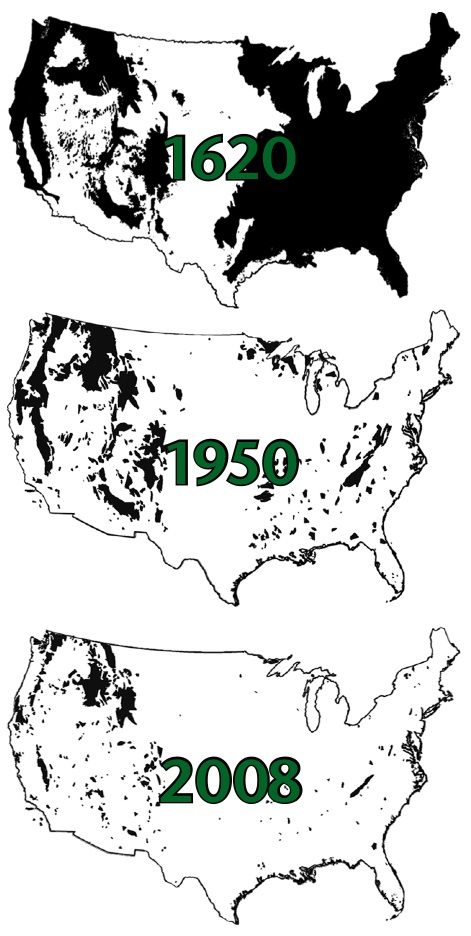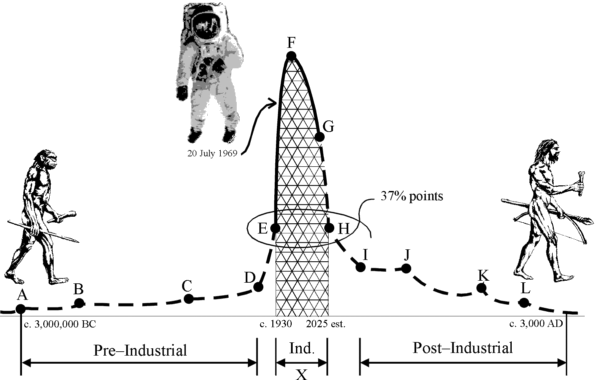Timelines
Too late to prevent energy and environmental crises
The military is very aware of the havoc that the end of cheap oil and the end of a relatively stable climate pose to civilization, and are ahead of the rest of society in planning for the disruptions. Renewable energy does not necessarily mean that it will power a democratic, more egalitarian society. The concentration camp at Guantanamo Bay in Cuba, run by the United States, is partially wind powered, since there is lots of wind and the Cuban government is not obligated to sell electricity to the US compound still occupying a small part of Cuba.
Perhaps the primary reason for the resource grab marketed as "The War on Terror" and the related "Homeland Security" surveillance system is an elite understanding that Peak Oil and Climate Change will reduce food and water supplies with tremendous consequences for billions of people dependent on industrial agriculture. Humanity is at the precipice of either allowing a global totalitarian approach to manage the crisis, or converting the military industrial complex, transnational corporations, the financial markets, media, etc. toward a planetary scale "global permaculture" response. The scale of the crisis is the largest in the history of civilization, so the response to these interconnected problems also needs to be the largest in the history of our species.

Deep Ecology
www.oilempire.us/deep-ecology.html
introduction to deep ecology:
John Seed and Ram Dass
Interview of rainforest activist John Seed, April 17, 1991
JS: I think the problem with trauma is that at the moment things seem so precarious for the Earth that if the traumas that we've already had aren't sufficient, then I'm afraid that any trauma that would be sufficient would also be lethal. For instance, the Director General of the United Nations Environment Program, Dr. Mostafa Tolba, says in his introduction to World Conservation Strategy that at the current rate of destruction, "we face by the turn of this century an environmental catastrophe as complete and as irreversible as any nuclear holocaust." And this is echoed by many scientists. So if this is true, that in the next ten years or so this will take place, it's hard to imagine any trauma sufficient to turn the huge inertia of this whole way of being around that wouldn't also just be a death blow to the planet. So then if not that, what can we hope for? And the only thing is something that I sort of feel ... It seems I have been evolving on this planet for four thousand million years. I've looked at the evidence, and it seems that as a creation myth this has advantages over an old man with a white beard creating everything six thousand years ago, or even a turtle with all of this growing on its back. The composition of my blood, and the relationship of that to the composition of sea water four hundred million years ago when we left the oceans, the whole growth of the human fetus with the vestigial tail and the gills, so, so many clues indicate that this is actually a true story of where we came from. And if that's the case, then I have been successful through all of that time. That whole road is littered with the bones of those who couldn't adapt, who couldn't adjust to the crisis of their time, whatever it was. But somehow I feel like we have this perfect pedigree, and that we must have some hidden resources that we're not aware of yet. And what could trigger us off so that we begin to identify with that larger body of ourselves rather than merely this tunnel vision that we have now, looking only at this very immediate time? So in the end nothing but a miracle would be of any use at this time. When you look at the rate of destruction, whether it's of the rainforest or the ozone layer, the climate, all of these things that are happening, and if you were to multiply all of the efforts of conservationists by a factor of ten or even a hundred, it wouldn't be enough. So there's nothing on the horizon that can help us, you know. And so then you think well, what kind of a miracle would that be? Well, it would be a very simple one, really. All that it would need would be for human beings to wake up one day different than they were the day before and realizing that this is the end unless we make these changes, and then deciding to make the change. That doesn't seem like a very likely thing to happen, but on the other hand the whole road that we've traveled is so littered with miracles that it's only our strange kind of modern psyche that refuses to see it. I mean the miracle of being descended from a fish that chose to leave the water and walk on the land--well, anyone with a pedigree like that, you can't lose hope. [emphasis added]
We are now faced with the fact that tomorrow is today. We are confronted with the fierce urgency of now. In this unfolding conundrum of life and history there is such a thing as being too late. Procrastination is still the thief of time. Life often leaves us standing bare, naked and dejected with a lost opportunity. The "tide in the affairs of men" does not remain at the flood; it ebbs. We may cry out desperately for time to pause in her passage, but time is deaf to every plea and rushes on. Over the bleached bones and jumbled residue of numerous civilizations are written the pathetic words: "Too late." There is an invisible book of life that faithfully records our vigilance of our neglect. "The moving finger write, and having writ moves on ..." We still have a choice today; nonviolent coexistence or violent co-annihilation.
-- Martin Luther King, Jr., April 4, 1967We know through painful experience that freedom is never voluntarily given by the oppressor; it must be demanded by the oppressed. Frankly, I have yet to engage in a direct action campaign that was "well timed" in the view of those who have not suffered unduly from the disease of segregation. For years now I have heard the word "Wait!" It rings in the ear of every Negro with piercing familiarity. This "Wait" has almost always meant “Never." We must come to see, with one of our distinguished jurists, that "justice too long delayed is justice denied."
-- Martin Luther King, Letter from a Birmingham Jail, 1963On this subject I do not wish to think or speak or write with moderation. No! No! Tell a man whose house is on fire to give a moderate alarm; tell him to moderately rescue his wife from the hands of the ravisher; tell the mother to gradually extricate her baby from the fire into which it has fallen -- but urge me not to use moderation in a cause like the present.
-- William Lloyd Garrison, on slavery from the Liberator, 1831
http://anz.theoildrum.com/node/3228#comment-264054
[-] memmel on November 15, 2007
Again the problem is we don't have a "contractible" society.
Its pure expand or die. ....We had a choice then and made the wrong decision since then its simply become progressively harder to change until our society and economic system needs growth for its shear survival. Thus its now impossible to convert to this new form.
We are talking about 100 years of misguided and squandered resources its not something you fix in a few years or even a few decades. We blew it after WWII and yet again in the 1970's. This is not baseball you don't get three strikes.
www.themonthly.com.au/tm/node/709
Eco-Worriers: Robyn Davidson on Michael Pollan's "The Omnivore's Dilemma" & Bill McKibben's "Deep Economy"
It would be interesting to know how many trees and how much oil (petrol for the delivery of, aviation fuel for the author promotion of, ink for the printing of, machines for shredding the remainders of), have gone into the plethora of books bringing us the bad eco-news in the decades since Silent Spring. It would be interesting to know whether the information contained in such books has moderated the habits of privilege of this most materially advanced era of all time, or changed any important policy decisions in a multinational boardroom.
I've read a lot of such books over the years. I admire the people who researched and wrote them, am in broad agreement with their conclusions, but I cannot say that they have radically altered the way I live. I know about nature's principles (no free lunches), and I've never liked the aesthetic of consumerism. But I do travel in aeroplanes. I wouldn't care for a life without aeroplanes in it.
And that's the problem, isn't it? How to give up something you've become habituated to, that underpins the structure of your life, even when you know it's bad news for your grandchildren. . .
Environmental books worry a lot. Yet they are almost always redemptive. I don't think I've read a single one that suggests it's too late: "That's it, Modern Man. Down oblivion's toilet with you and all your works. The only choice now is whether your civilisation ends in bangs or whimpers."
The two under review - The Omnivore's Dilemma: The Search for a Perfect Meal in a Fast-Food World, by Michael Pollan . . . and Deep Economy: The Wealth of Communities and the Durable Future, by Bill McKibben . . . follow the usual format. They are well researched and written with passionate dedication. They use catchy metaphor or structural gimmick to carry the frightful information forward. That information is hair-raising, appalling, yet each suggests that if we just ... change ... (soon, very very soon), we will scrape through. . . .
native forest in the United States of America (48 states)

graphic courtesy of the Native Forest Council
Too late to influence the empire?
John Kennedy, Junior was asked (shortly before he went down in a plane crash) if his magazine was going to reopen the issues surrounding the murder of his father. His reply was too much time had passed for it to be politically relevant.
9/11 truth needs to be politically relevant in the very near term, not decades from now, to achieve the needed goals.
The JFK truth movement succeeded in one way -- most people don't believe the Warren Commission report. But it ultimately failed, since it was unable to undo the damage caused by the coup in Dallas -- and no President since has cut the military industrial complex budget. The JFK coup led to the Vietnam war, Watergate, October Surprise, Iran-Contra, Oklahoma City, 9/11, and now the permanent war for Peak Oil "that will not end in our lifetimes."
When the Patriot Act is repealed and Homeland Security reverts back to its pre-9/11 structures, perhaps then 9/11 truth would be considered a success. When a large proportion of the public accepts the paradigm of how "false flag" operations happen, and how terror events can be allowed to happen, they will no longer be a useful tool for bamboozling the public.
Tying 9/11 truth to civil liberties protections and the fundamental issues of Peak Oil is probably the best path for making 9/11 truth more practical for political change. Ideally, 9/11 truth could lead to reductions in the military budget so these resources could be used for permaculture solutions to Peak Oil and climate change.
Maybe not too late: a Nixonian example
In 1969, newly elected Nixon escalated the war on Vietnam. Many in the peace movement felt discouraged that their protesting and other actions were not slowing down the war. It was revealed years later that Nixon had secretly threatened north Vietnam with nuclear attack. The Vietnamese realized he was bluffing, he did not have the support of the US public to do that -- and they ignored the threat (and Nixon eventually stood down). It is possible that the collective efforts of the 9/11 truth movement had positive impacts behind the scenes that we may learn about in the future.
Some 9/11 truth activists have wondered how this effort is going versus similar initiatives to expose the coup against President Kennedy. New Orleans District Attorney Jim Garrison was on the "Tonight Show" about 5 years after the coup in Dallas, although he was not treated well. NBC also did a show about him that was about as pleasant as the Popular Mechanics 9/11 article. He had a mix of positive reactions from ordinary citizens (who were skeptical of the official story) but never got the positive press that he deserved for his independent investigation.
Garrison's independent investigation was the ONLY legal process against any of the conspirators (a story told in the film "JFK" by Oliver Stone, although Garrison's auto-biography "On the Trail of the Assassins" is even better than the film). His prosecution was sabotaged by fake witnesses inserted into his legal strategy, similar to the "no-planes" claims that sabotaged our credibility (especially in the Washington, DC area).
9/11 timelines:
warnings, wargames and the scandal of the century
www.oilempire.us/911timeline.html
The 9/11 Timelines compiled by From the Wilderness and the Center for Cooperative Research prove beyond reasonable doubt that the 9/11 attacks were deliberately allowed to happen by the Bush-Cheney regime. These timelines also include the best compilations of information about the various war game exercises underway during 9/11.
 |
 |
Those 9/11 activists know how critical it is to construct a timeline, because the timeline tells us who did what and when they did it. The timeline will tell us the truth. The timeline cuts through the spin. So, of course, I made a point to get in touch with the folks who were collecting the timelines, and there are a lot of timelines available on the Internet. Think Progress has a timeline, and WWL also has a timeline.
-- Rep. Cynthia McKinney, discussing the Katrina scandal chronology
www.fromthewilderness.com/free/ww3/091505_world_stories.shtml
No Planes on 9/11: hoax history
www.oilempire.us/no-plane-timeline.html
The most important disinformation to bait the 9/11 truth movement has been the false claim that Flight 77 supposedly did not crash into the mostly empty part of the Pentagon, a hoax first unveiled by War Secretary Donald Rumsfeld on October 12, 2001.
The Complete No Planes on 9/11 Timeline details how this hoax was unveiled, seeded into the 9/11 truth movement, and then when the truth movement began to get political attention the no plane hoaxes were given media attention while the real evidence of complicity continued to be ignored.
Media 9/11 Strategy:
highlight hoaxes, avoid best evidence
www.oilempire.us/media-strategy.html
The mainstream corporate media and the foundation funded alternative media have shared the same strategy to deal with 9/11 complicity information -- highlight the hoaxes and avoid the best evidence.
Democracy Now! timeline
www.oilempire.us/democracy-now.html
Democracy Now!'s efforts to avoid connecting the dots between 9/11 and Peak Oil
DN's September 11, 2006 "fake debate" between the Hearst Corporation's Popular Mechanics (no conspiracy) and Loose Change (no planes) - each side had pieces of the truth but both were lying. A month later, Hearst started syndicating a new column by DN's Amy Goodman.
Towers of Deception by Barrie Zwicker
www.oilempire.us/towers.html
A book review that highlights a dramatic example of how unintentional promotion of the hoaxes sabotaged the 9/11 truth movement.
Election Fraud: rigged selections
www.oilempire.us/elections.html
The problem of fake Presidential elections did not start in 2000 - it has been a problem for several decades, at least since 1936. This timeline suggests that Presidential candidates are selected by elites before the actual elections.
Climate Change: time's up!
www.oilempire.us/climate-time.html
Warnings such as Al Gore's admonition in his 2006 film An Inconvenient Truth that humanity has perhaps a decade to address the climate crisis ignore previous warnings around 1990 from numerous eminent authorities (including Senator Al Gore) that the 1990s would be the decade of decision on the environment. Since industrial civilization did not make a serious effort to shift course a few decades ago when the warnings of the environmental movement became prominent, now we are facing the consequences of collective inaction.
Few people warning about climate change have the nerve to point out how Al Gore promoted numerous policies that made the environmental crises worse when he was Vice President - including the NAFTA treaty, the World Trade Organization, abolition of the strongest food safety laws, hazardous waste incineration, massive expansion of the interstate highway system, more oil drilling in northern Alaska and the Gulf of Mexico, and energy deregulation schemes that resulted in reduction of utility efficiency programs.
"it’s probably too late for pro-active measures on climate change now anyhow. A thorough collapse of the US economy, with people no longer able to afford cars and gas to drive them, might do more to slow the global heating cycle than any measures that a Democratic Congress and administration might pass."
-- Dave Lindorff, Why Not Let the Republicans Deal with This Mess?, August 23 / 4, 2008
www.counterpunch.org/lindorff08232008.html
Katrina timelines
www.oilempire.us/katrina.html
This page links to several timelines of the federal non-response to the Katrina disaster which disprove the "incompetence" theory.
Peak Oil: from 1859 to the Peak
www.oilempire.us/peak-timeline.html
The Peak Oil timeline chronicles the rise (and imminent fall) of the age of oil. It is especially noteworthy to recognize that elite planners of empire have had access to information for half a century that accurately predicted the current energy crises. People who want to use the remaining oil for peaceful purposes (renewable energy systems, relocalization of production, etc) need to understand why these solutions have been ignored and sabotaged in previous decades -- the solutions are decentralized and therefore not of interest to most of the elites. The 2005 "Hirsch Report" from the U.S. Department of Energy said it would take two decades to mitigate the impacts of Peak Oil, but it is here, now.
Every major war since World War I (the war to end wars, supposedly) has been fought with oil, and many of them have been fought to control oil (at least in part). Most wars are conflicts over resources, with ideological justifications used to distract from underlying motives.
The War on Iraq is part of the long anticipated Peak Oil Wars, a global conflict to grab as much of the energy resources as possible.

"For a world facing the end of growing energy production, this means that the changes should have begun decades ago, giving time for a gradual transition. We had our warning back in the 1970s, when there might have been time to make a transition to a society independent of fossil fuels. Now it is simply too late. It is a waste of our time talking about a hydrogen future, or zero point energy, or a breakthrough in fusion. Even if we could find a technological quick fix, there is no time left to make the transition.
"This is not to say that our future has to be bleak. We might be able to make a transition into a simpler society. In fact, if we can concentrate our efforts on easing the decline and on building an equitable and democratic social system, we might manage to provide a comfortable existence for ourselves and for the generations to come."Drawing Lessons from Experience;
The Agricultural Crises in North Korea
and Cuba -- Part 1
Why Changing the Way Money Works is the Key
to Resolving Peak Oil Challenges
by Dale Allen Pfeiffer
FTW Contributing Editor for Energy
© Copyright 2004, From The Wilderness Publications, www.fromthewilderness.com
Peaked Oil: on the petroleum plateau
www.oilempire.us/peaked.html
As of the close of 2007, the all time maximum rate of oil extraction was in 2006 (including unconventional oil such as tar sands). It is no longer when the "peak" will be -- now we are at "peaked oil."
Even if some future year somehow has an additional, higher peak point of production, that would not change the reality that the easy to extract oil is passed and we are entering the era of expensive, difficult to extract oil. A majority of the remaining oil is in the Islamic parts of the world, the real reason for the "war on terror."
OPEC's Quota Wars: less oil than we think
www.oilempire.us/quota-war.html
In the 1980s, the Middle Eastern oil exporting countries inflated their estimated petroleum reserves. The rules of OPEC - the Organization of Petroleum Exporting Countries - stated that members could export oil levels in amounts based on their overall reserves. In a period of a few years, the OPEC members around the Persian / Arabian Gulf all suddenly announced significant increases in their total reserves (50% and greater), but these increases were not accompanied by oil field discoveries. These phantom reserves allowed short term increases in revenues (from the increase in oil exports) but these production increases merely sped up the overall point of Peak Oil for these countries.






